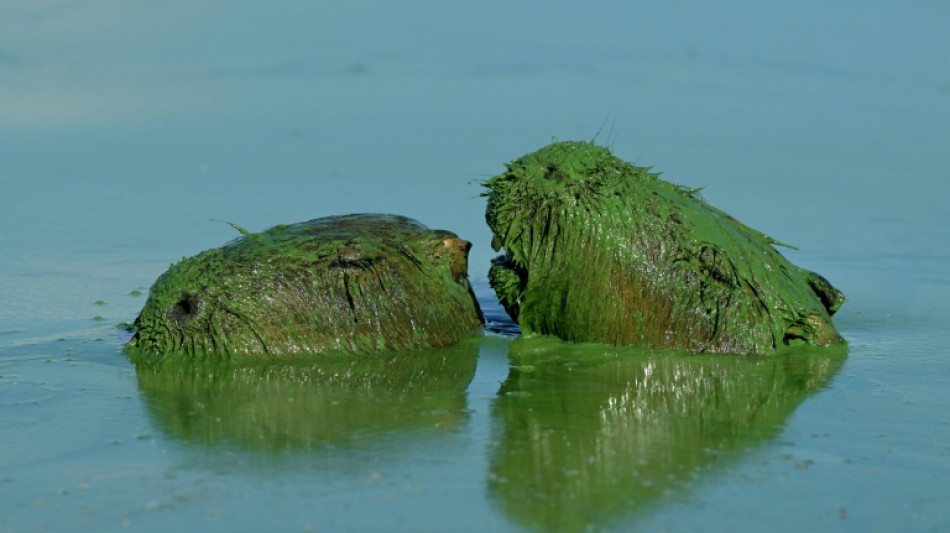
-
 'Not the end': Small US firms wary but hopeful on tariff upheaval
'Not the end': Small US firms wary but hopeful on tariff upheaval
-
US freestyle skier Ferreira wins Olympic halfpipe gold

-
 Svitolina edges Gauff to set up Pegula final in Dubai
Svitolina edges Gauff to set up Pegula final in Dubai
-
'Proud' Alcaraz digs deep to topple Rublev and reach Qatar final

-
 UK govt considers removing ex-prince Andrew from line of succession
UK govt considers removing ex-prince Andrew from line of succession
-
New study probes why chronic pain lasts longer in women

-
 Trump vows 10% global tariff after stinging court rebuke
Trump vows 10% global tariff after stinging court rebuke
-
Aston Martin in disarray as Leclerc tops F1 testing timesheets

-
 Venus Williams accepts Indian Wells wild card
Venus Williams accepts Indian Wells wild card
-
Anxious Venezuelans seek clarity on new amnesty law

-
 Last-gasp Canada edge Finland to reach Olympic men's ice hockey final
Last-gasp Canada edge Finland to reach Olympic men's ice hockey final
-
Scotland captain Tuipulotu grateful for Wales boss Tandy's influence

-
 Zelensky says no 'family day' in rare personal interview to AFP
Zelensky says no 'family day' in rare personal interview to AFP
-
Zelensky tells AFP that Ukraine is not losing the war

-
 Sweden to play Switzerland in Olympic women's curling final
Sweden to play Switzerland in Olympic women's curling final
-
Counting the cost: Minnesota reels after anti-migrant 'occupation'

-
 UK police probe Andrew's protection as royals reel from ex-prince's arrest
UK police probe Andrew's protection as royals reel from ex-prince's arrest
-
Doris says Ireland must pile pressure on England rising star Pollock

-
 US military assets in the Middle East
US military assets in the Middle East
-
Neymar hints at possible retirement after World Cup

-
 Stocks rise after court ruling against US tariffs
Stocks rise after court ruling against US tariffs
-
Australia end dismal T20 World Cup by thrashing Oman

-
 Olympics chief says Milan-Cortina has set new path for Games
Olympics chief says Milan-Cortina has set new path for Games
-
Russian SVR spy agency took over Wagner 'influence' ops in Africa: report

-
 Pegula fights back to sink Anisimova and reach Dubai final
Pegula fights back to sink Anisimova and reach Dubai final
-
Trump administration denounces 'terrorism' in France after activist's killing

-
 Colombia's Medellin builds mega-prison inspired by El Salvador's CECOT
Colombia's Medellin builds mega-prison inspired by El Salvador's CECOT
-
German broadcaster recalls correspondent over AI-generated images

-
 US Supreme Court strikes down swath of Trump global tariffs
US Supreme Court strikes down swath of Trump global tariffs
-
England's Itoje says managing 'emotional turmoil' key to 100 cap landmark

-
 Trump says weighing strike on Iran as Tehran says draft deal coming soon
Trump says weighing strike on Iran as Tehran says draft deal coming soon
-
Tudor is '100 percent' certain of saving Spurs from relegation

-
 Azam dropped for scoring too slowly, says Pakistan coach Hesson
Azam dropped for scoring too slowly, says Pakistan coach Hesson
-
Stocks volatile after soft US growth data, court ruling against tariffs

-
 Italy bring back Capuozzo for France Six Nations trip
Italy bring back Capuozzo for France Six Nations trip
-
From Malinin's collapse to Liu's triumph: Top Olympic figure skating moments

-
 Arteta urges Arsenal to 'write own destiny' after title wobble
Arteta urges Arsenal to 'write own destiny' after title wobble
-
Ukraine Paralympics team to boycott opening ceremony over Russian flag decision

-
 Wales captain Lake wants fans to bring 'noise' against Scotland
Wales captain Lake wants fans to bring 'noise' against Scotland
-
Skier Vonn's Italian hospital a hotbed of men, sister says

-
 India target S.Africa top order, Abhishek to come good: bowling coach
India target S.Africa top order, Abhishek to come good: bowling coach
-
Carrick praises Man Utd 'diversity' after Ratcliffe's immigrant rant

-
 I never thought it would be hit, says 'Scream' creator 30 years later
I never thought it would be hit, says 'Scream' creator 30 years later
-
AI summit statement delayed to 'maximise' signatories: India

-
 Barcelona's Sagrada Familia basilica hits peak height
Barcelona's Sagrada Familia basilica hits peak height
-
Milan sprints to second straight UAE stage win as Tiberi keeps lead

-
 US GDP growth misses expectations as Trump blames shutdown
US GDP growth misses expectations as Trump blames shutdown
-
Benfica investigate video of fans' monkey gestures

-
 French minister pledges tight security at rally for killed activist
French minister pledges tight security at rally for killed activist
-
Guardiola 'couldn't care less' about Arsenal stumble in title race


Argentina's giant rodents dyed Hulk green by algae
First a river ran blood red. Now Argentina's beloved giant rodent, the capybara, has been coated in Hulk-green slime as pollution turns the country's waterways traffic light colours.
The capybara, also known as a carpincho or chiguire, is the world's largest rodent, measuring up to 1.35 meters (4 feet four inches) in length and weighing up to 80 kilograms (176 pounds).
An AFP photographer snapped several of the tufty creatures that had been stained pea green along the Uruguay River north of Buenos Aires on Thursday where a rotten smell hangs in the air and dead fish lay strewn on the banks.
Each year, bacteria cause a thick greenish layer to coat the shores around the Salto Grande hydroelectric dam, on Argentina's border with Uruguay. The phenomenon has increased in intensity in recent years.
These cyanobacteria "are photosynthetic organisms that perform an important function in the ecosystem," Diego Frau, a biologist at the National Institute of Limnology told AFP.
But in high concentrations they can be destructive and toxic, he said.
High temperatures and high levels of nutrients in the water, partly driven by livestock farming, causes the algae to spread.
Climate change is causing the green tide, which can last for several weeks, to become "increasingly recurrent," damaging ecosystems, he said.
In people, mild exposure to the bacteria can cause skin conditions or "flu-like symptoms" such as diarrhea, vomiting and headaches, Martin Novoa, a biologist at the Faculty of Food Sciences at the National University of Entre Rios, told AFP.
Prolonged exposure can lead to liver and nervous system complications, he added.
At least 15 municipalities in Buenos Aires province have issued health alerts over the bacteria.
The outbreak comes a week after a stream running through a town near Buenos Aires turned blood red and emitted a foul smell.
The stream flows through an area of textile and hide processing factories.
Residents accused factories of dumping waste in the river.
Environmental officials are studying the cause of the discoloration, which lasted a few hours.
J.Williams--AMWN



